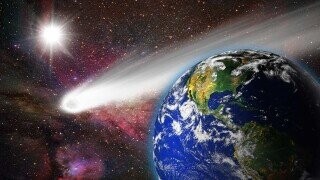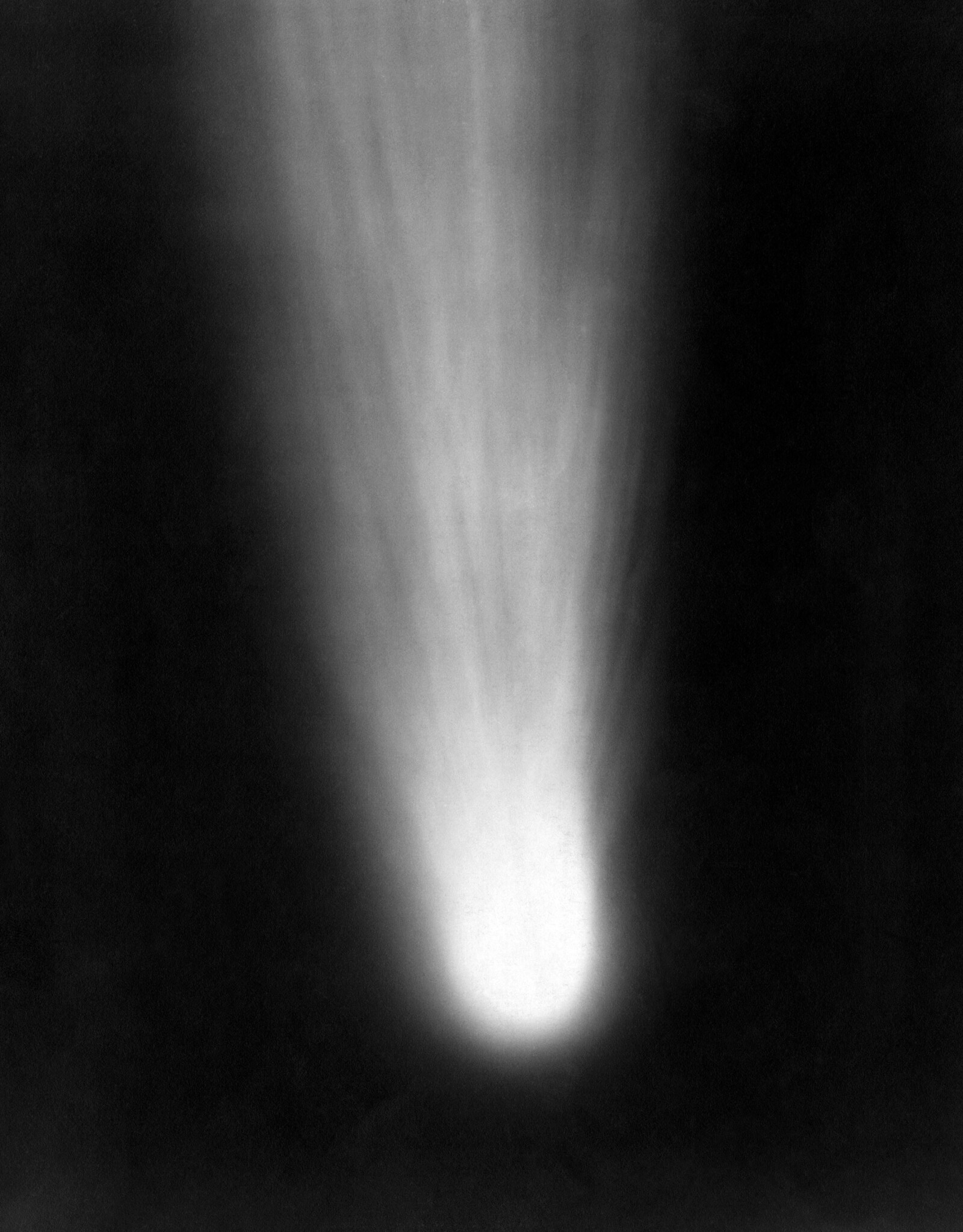In 1910, Americans Thought Halley's Comet Was A Doomsday Event

Welcome to Oofageddon! or Cracked's history of D+ end-of-the-world prognostications. You can find parts 1 and 2 here.
Halley’s Comet swings by Earth about every 75 years, like a celestial deadbeat relative looking for attention. We started spotting it over two centuries before Christ was born -- ancient Chinese and Babylonian astronomers took note of it -- but it wasn’t until 1705 that astronomer Edmond Halley realized we were seeing the same hunk of rock every time, so he got his name slapped on it.
Don't Miss
Comets and their astrological ilk have always inspired apocalyptic predictions, because it’s easier to believe that destiny is unfolding before your eyes when even the sky itself appears to be telling you as much. Sometimes comets even happen to coincide with historical events, like when a comet appeared not long before London suffered both a plague and the Great Fire. Halley’s accompanied the Norman Invasion. If you find such coincidences creepy, a clockwork comet that appears once a generation might as well be a stage prop sent by God. And so, when Halley’s Comet swung by in 1910, astronomer Camille Flammarion predicted that it might end all life on Earth.

Everett Collection
1910 was the first time the comet’s tail could be subjected to spectroscopic analysis, and cyanogen was discovered among the gunk the comet was carting around. Because Earth was going to pass through the tail, Flammarion suggested the toxic cyanogen “would impregnate the atmosphere and possibly snuff out all life on the planet.” And, despite every other astronomer out there saying “Uh, no that’s not how comets work,” mention of Flammarion’s theory in The New York Times was all it took to unleash the quacks.
Aside from the fact that you’ve alive to read this, you can probably see the obvious flaw in Flammarion’s reasoning: the gas was way, way, way too diffused to have any impact, which is why you can’t kill someone with a peanut allergy by eating a Snickers and then coughing on them a week later. But that didn’t stop the sale of gas masks, protective elixirs, and anti-comet pills made of sugar and quinine.
Most people knew nothing would happen. There were watch parties, bars served “cyanogen cocktails,” and comet-themed songs and jokes made the rounds. But the more compelling story came from catering to the cranks, which makes Halley’s Comet a good example of how a panic can be ginned up out of essentially nothing.
First Flammarion, a well-known and respected astronomer, was mostly quoted out of context. He’d only suggested that doom was a possibility, but that was the most interesting part to focus on. And because the venerable Times had made the claim, other publications felt it was appropriate to weigh in, creating a feedback loop until the comet became a daily story. Other scientists began fighting the claim, but they were slow to speak out and admitted there was technically a miniscule chance they were wrong. By that point, charlatans had already moved in to take advantage of the scare, and the vulnerable and the gullible suffered.
Some reactions were merely embarrassing. Homeowners caulked their windows to keep gas from drifting in, possibly spurred on by leaflet campaigns warning readers to stay indoors as “poisonous gases will fill the heavens.” Churches got together to pray, kids in Chicago tried to wiggle out of school by blaming “fear of some untoward happenings,” and a few farmers reportedly removed their lightning rods in case they somehow attracted the comet. Hey, better safe than sorry, right?

But there were also reports of people drinking themselves into stupors and selling all their possessions to live it up while they still could. These may have been exaggerated -- at least one report that a group of religious extremists in Oklahoma tried to appease the comet by sacrificing a virgin, only to be stopped by the police, was a hoax -- but the scare has also been linked to suicides, mental breakdowns, and the hoarding of oxygen tanks.
It’s easy to dismiss this as ignorance and superstition, but apocalyptic predictions often emerge when, well, things are feeling pretty dang apocalyptic out there. According to a missionary working in China, there were concerns that Halley’s Comet had poisoned the water, and the comet’s arrival was seen as a portent of war and calamitous change. And then a few months later, the Xinhai Revolution began, killing hundreds of thousands of people and ending over two millennia of imperial rule. Similar concerns were supposedly voiced in Korea, which was annexed by Japan shortly after the comet came by. When change is already in the air, it doesn’t take much of an excuse to assume the worst is coming.

Everett Collection
British believers got their evidence too, as King Edward VII happened to die while Halley’s Comet was present. While the obvious explanation was that a 68-year-old man who smoked cigars as fast as they could be handed to him and dismissed his repeated heart attacks as minor obstacles in his working day had succumbed to his health problems, the looming comet let more superstitious people believe what they would.
Oh, and this wasn’t even the only comet to freak people out in 1910. Before Halley swung around, the Daylight Comet arrived in January. Like an erection at a funeral, it was unexpected yet obvious. Appearing essentially out of nowhere, it was possibly the brightest comet of the century and a source of confusion to a public that had already been reading stories about Halley’s imminent return. A few newspapers made claims of panic, and while these may have amounted to “We heard about a guy who heard about a guy,” it got people thinking about comets and underlined the fact that astronomers didn’t have all the answers. If they did, they would have seen the Daylight Comet coming in the first place.
The apocalypse changes with the times and, in 1910, purely religious claims had given way to scientific doom. That the majority of astronomers saw no cause for concern was no reason to ignore the weirdos who did, creating a story that made newspapers take the lazy ol’ “well, both sides make good points” stance on the issue of whether a rock hurtling through space would kill us all. Believers could point to the “science” they liked and the sources that parroted it, and a market sprung up to take advantage of them. Over a century later, that hasn’t really changed.
Flammarion himself was an oddity, a sincere believer in some of the era’s spiritual trends but also generally dismissive of mediums, psychics, and other forms of quackery thanks to his (relatively) robust application of the scientific method. His own whimsy may have gotten the better of him -- in 1893 he’d written a novel about a comet colliding with the Earth -- and by the time he tried to walk back his claims about Halley’s Comet the story was already out of control. He would remain a trusted scientific source while also publishing a book arguing that ghosts were probably real, but only in a tiny fraction of claimed cases.
If there’s a lesson we can learn from the comet apocalypse that wasn’t, maybe it’s that we tend to panic when the experts tell us not to yet become prone to demanding that life goes on as normal when we’re told it needs to change. It’s like there’s always a need to believe the contrarian story, to demand the drama of the apocalypse when life is fine and the steadiness of normality when it isn’t. Or maybe comets are just big and scary.
Mark is on Twitter and has a brand new collection of short stories.
You can check out further installments of Oofageddon! below:
The Woman Who Was Pregnant with the Messiah (at 64)
In 1844, Americans Sold All Of Their Stuff Because Jesus Was Coming Back
In The '60s, The Truly Devoted Believed Aliens Would Save Us From Nukes
In The 1970s, A Bestseller Claimed The Planets Would Align And Destroy Everything